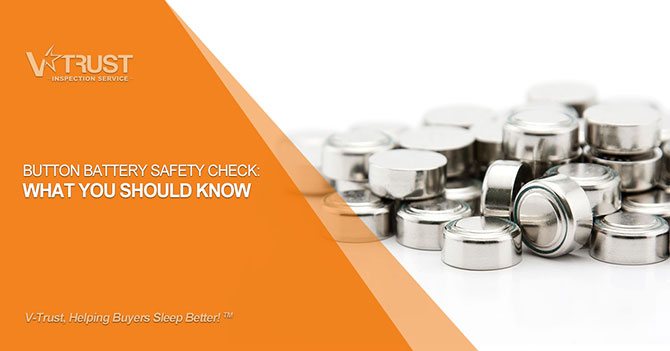Button batteries are by far the most harmful type of battery if swallowed by young children. It is estimated that about 3,500 button batteries are swallowed by young children each year in the United States alone.
Button batteries are small, round batteries that come in many different sizes and types. Lithium button batteries (often called ‘coin batteries’ or ‘coin cell batteries’) are the most powerful. They are found mostly in portable devices such as slim remote controls, gaming headsets, car key fobs, toys, novelty items, gadgets and other everyday objects you’ll find around the house.
If a button battery gets stuck in a child’s food pipe, it can cause catastrophic internal bleeding and death within hours of being swallowed and it may occur in different ways:
- household or other products which use button batteries do not have secure or ‘child resistant’ battery compartments
- products are supplied with uninstalled button batteries in packaging that is not child resistant
- new or replacement button batteries are purchased in packaging that is not child resistant
- old or spent button batteries have been removed from a product but not properly disposed of.
Basic safety measures required for consumer products containing button batteries which young children may come into contact with, must be taken seriously by importers:
- button batteries mustn't be available without tool assistance, unless the product's battery case cover requires at least two separate and simultaneous movements to be opened.
- products containing batteries must contain a special label to alert consumers to the danger of exposure to batteries by young children when operating, and this information needs to be clearly visible at sale
There are a number of international standards that relate to button battery safety. Major battery manufacturers have voluntarily adopted international standards such as UL 4200a or ANSI C18.3M. The following table lists some of the standards relevant to button battery safety:
|
Name of the standard |
Description |
|
UL 4200A - Standard for Safety of Products Incorporating Button or Coin Cell Batteries of Lithium Technologies |
This standard requires the battery compartment of a product be designed to be opened only by the use of a tool or a minimum of two independent and simultaneous movements. Where a button or coin cell battery is not intended to be replaced, the battery is to be inaccessible by an enclosure or held fully captive by the product. A safety alert symbol and a hazard warning is required on the product and in the instructions. |
|
ASTM F963-11: Standard Consumer Safety Specification for Toy Safety |
This standard requires that no batteries in toys for children under 14 years of age should be accessible except with the use of a tool where the battery can fit in the small part test cylinder. |
|
ANSI C18.3M, Part 2-2011 American National Standard for Portable Lithium Primary Cells and Batteries–Safety Standard |
This standard specifies tests for portable primary lithium cells and batteries to promote the safe design of batteries. It also includes safety information on keeping small batteries out of reach of children. Marking requirements state a caution on ingestion should be included for small batteries (on the packaging if not on the battery itself) and that battery compartment closures should be designed to prevent access by children. |
Source:https://www.productsafety.gov.au
In addition, during regular product inspections, inspection engineers must also pay extra attention to basic safety tests on-site.
Additional laboratory tests and certification to ensure that the product complies with markets’ regulations such as CE, EMC, FCC, INMETRO and UL, are also considered a must if you consider importing consumer products that contain batteries which can be accessible to young children.
For more information concerning regulations and how an inspection company can help ensuring your products are safe and meet local regulations, please contact us at info@v-trust.com.




Discussion